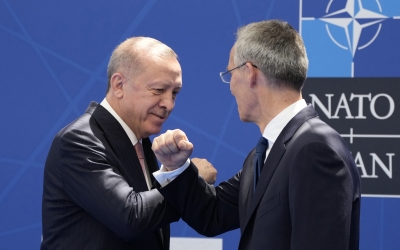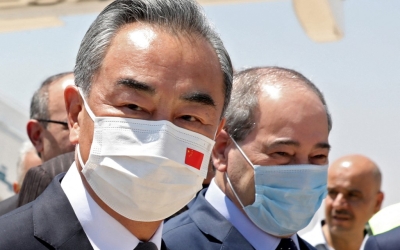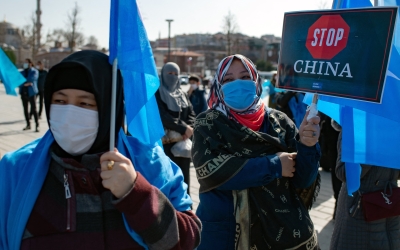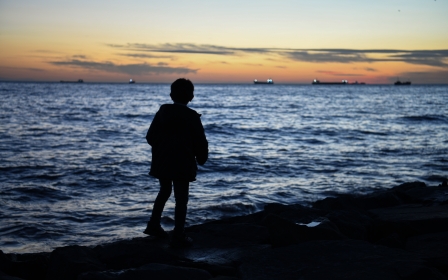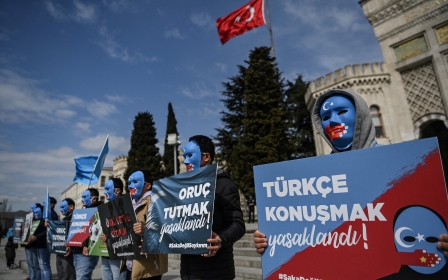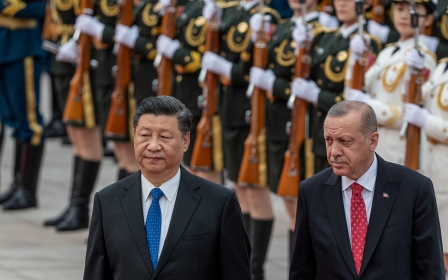Turkey and China keep relations on track despite Uighur dispute
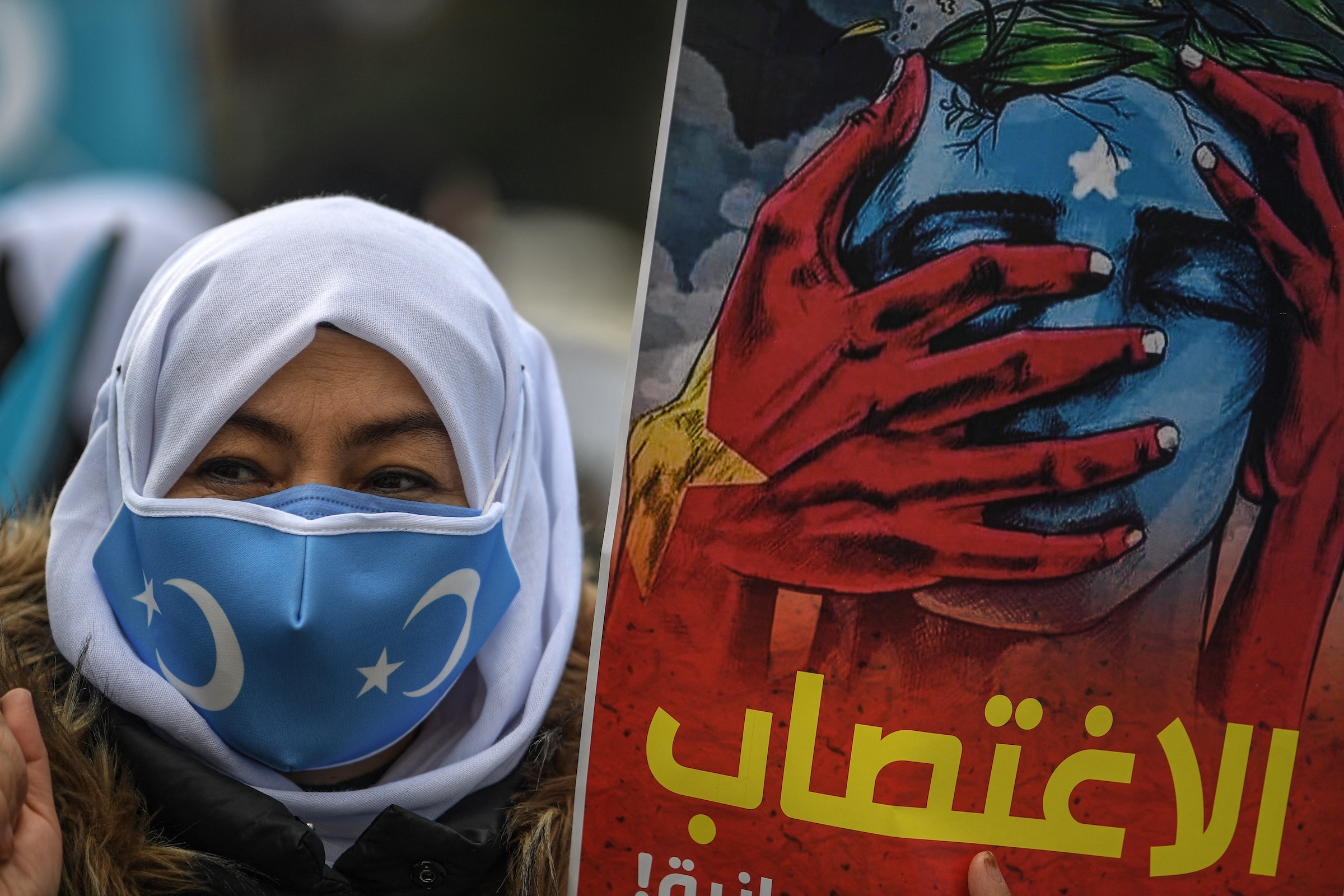
The ties between Turkey and China seem to be on the up and up, if the warm exchanges between their top diplomats are any indication.
President Recep Tayyip Erdogan has been engaging in a friendly dialogue with his Chinese counterpart, Xi Jinping, encouraging China to invest in Turkey. Turkey's economy is in serious need of cash, and Ankara's relations with the West are on the rocks.
'China stands to help fill the role as a global-power ally. Erdogan needs as many as he can get while the lira collapses'
- Richard Kraemer, Middle East Institute
While Beijing's Uighur policy is still causing tension between the two nations, so far the intermittent war of words between them has not been a major threat to their cooperation.
Despite once calling Beijing's policy towards its Uighur Muslim population "almost a genocide," Erdogan's more urgent tasks these days include tackling the soaring inflation and unemployment rates in Turkey brought on by the coronavirus pandemic, as well as looking ahead to next year's election.
Turkish Foreign Minister Mevlut Cavusoglu, after his first meeting in 2022 with his Chinese counterpart, shared some key points from their talks.
New MEE newsletter: Jerusalem Dispatch
Sign up to get the latest insights and analysis on Israel-Palestine, alongside Turkey Unpacked and other MEE newsletters
"We evaluated economic cooperation opportunities.
"We conveyed our views, expectations and sensitivities regarding the issues on our agenda, especially the Uighur Turks," Cavusoglu said in a tweet, in that order.
Last year, Turkey and China celebrated 50 years of diplomatic relations, and, according to a Turkish envoy, the "tragedy" of the pandemic has brought the two countries "even closer".
"We regard the Turkey-China diplomatic ties not merely as a government-to-government relationship, but as an indispensable exchange between two ancient civilisations acting as the westernmost and easternmost gateways to Asia," Abdulkadir Emin Onen, Turkish ambassador to China, said in a statement published by the Chinese state news outlet CGTN to mark the occasion.
Turkey, aware that cooperation with China is currently vital for its economy, is handling the Uighur issue with kid gloves.
Mutually beneficial relations
Ankara's relations with Beijing have been on a rollercoaster ride. Frosty for decades, the ties have improved rapidly in recent years as Turkey has gravitated away from its Nato partners to embrace non-western countries, including Russia.
Now, as Ankara tries to recover its fragile economy from the impact of the coronavirus pandemic, and as tensions with Washington persist, it's no longer shy about seeking China's support.
Unlike many other countries, Erdogan has refused to ask for assistance from the International Monetary Fund. Talks on a swap deal with the US Federal Reserve have so far not yielded results, and there is reason to doubt that Turkey would meet the criteria for such an arrangement.
Exports and tourism have risen on the back of a cheap currency, narrowing the trade deficit. However, the central bank is bleeding dollars to prop up the lira, which recently hit a record low.
Another main reason for the economic difficulties is Turkey's tense relationship with the West, as European Union countries and the United States are criticising Turkey for violating basic human rights and the rule of law. That even prompted the US to impose a limited number of sanctions in 2018 and pushed Turkey closer to Russia and China.
"China stands to help fill the role as a global-power ally. Erdogan needs as many [allies] as he can get while the lira collapses," said Richard Kraemer, a non-resident scholar in the Frontier Europe Initiative in the US-based Middle East Institute.
Furthermore, China is providing healthcare assistance to its partner. More than 10 million people in Turkey have been vaccinated with CoronaVac, the Covid-19 shot developed by the Beijing-based Sinovac.
Kraemer thinks that Turkey's cooperation has been crucial for China, too.
"In matters of trade or the military, Turkey remains of considerable geopolitical significance," he told Middle East Eye.
According to Kraemer, Turkey, located on a key route for China's Belt and Road Initiative, has a cultural understanding that runs from the western Balkans to the Zagros mountains, and that's an important asset to China.
In 2010, the Chinese premier visited Ankara and concluded a strategic cooperation agreement. Since then, trade has increased significantly, with a flurry of big-ticket infrastructure deals.
In 2016, the two countries signed another memorandum of understanding for the Trans-Caspian International Transport Route for containerised rail transport from China to Europe. The first China-bound cargo train from Turkey departed in December 2020, arriving in Xi'an in just two weeks, halving the travel time for shipment of goods. The unofficial name given to the railway is "The Iron Silk Road".
Erdogan himself has visited Beijing a number of times, including in 2017 for a large international forum devoted to the Belt and Road Initiative.
Global power shift
The courtship seems to be paying off. According to Turkish Trade Ministry and Turkish Statistical Institute data, between January and November 2021 China was at the top of Turkey's import partners list, and 16th on its export partners list. Between 2016 and 2019, Chinese investment in Turkey approached $3bn.
As well as rail transport, China and Turkey are cooperating on seaborne freight, as China owns 65 percent of the Kumport container terminal in Istanbul, the third-biggest port in Turkey, acquired for $950m.
Joint transport investments have also seen a Chinese consortium take a 51 percent stake in the third bridge on the Bosphorus, Yavuz Sultan Selim Bridge.
However, this consortium has been shaken by one of the stakeholders' decision to withdraw in the summer of 2021. The reason for that was not made public, but diplomatic sources in Ankara told MEE that it was purely about the Chinese company's business interests, and it was not a significant step back for economic relations.
Around the same time last year, a new $3.6bn swap agreement was signed between the two countries. Combined with previous deals, the total reached $6bn in value. Erdogan made the announcement ahead of his visit to Brussels for the Nato meeting in June, where he met US President Joe Biden for the first time since the latter was elected.
However, one expert warns that the reality might not be as rosy as it appears for Turkey, and that the relationship is much more in favour of China.
"Turkey sees more than $20bn of deficit in its trade with China, and the deficit increases every year," Nurettin Akcay, a Turkish scholar who received his PhD from Shanghai University and is an expert on China-Turkey relations, told MEE.
In addition, foreign direct investment in Turkey fell between 2016 and 2020, from $12.18bn to $6.67bn. "Thanks to the credits and investments, Turkey turns a blind eye to this disadvantageous situation," Akcay said.
In the grand scheme of economic expansion, the alliance fortifies Turkey and China's position against mutual competitors in regions such as Central Asia, the Eastern Mediterranean and East Africa - namely the US and the EU.
"Together with Russia, China and Turkey rely on each other to create a more multipolar world where the political and economic centres are no longer limited to the West," said Filip Noubel, managing editor at Global Voices, who lived and worked in Asia for many years.
What about the Uighurs?
The plight of the Uighurs in China has long been an issue for Turkish nationalists, as the majority-Muslim minority is ethnically and cultural Turkic and speaks a variation of the same language. The region of China inhabited by Uighurs is referred to by pan-Turkic nationalists as East Turkestan.
China has repeatedly denied that it is carrying out abuses of Uighurs, despite a 2018 Human Rights Watch report that detailed the "mass arbitrary detention, torture, forced political indoctrination, and mass surveillance of Xinjiang's Muslims".
Turkey has previously raised concerns about China's treatment of the Uighurs. In February 2019, the foreign ministry issued a statement in which it said: "It is no longer a secret that more than one million Uighur Turks incurring arbitrary arrests are subjected to torture and political brainwashing in internment camps and prisons. Uighurs who are not detained in these camps are under heavy pressure."
Later that year, China invited Turkey to send a delegation to the Xingjiang region to observe how the Uighur minority was being treated.
Beijing has repeatedly urged Ankara to keep its hands off China's Uighur issues. In his meeting with Cavusoglu in January, Chinese Foreign Minister Wang Yi issued another reminder.
"It is hoped that the two sides will firstly support each other in safeguarding their own sovereignty, security and development interests," Wang said.
There's too much at stake for both sides to allow a conflagration, according to Kraemer.
"That's why the partnership grew in spite of the recent row on the Uighur issue, which was put in the freezer for almost 10 years. Could it happen? The economic and political advantages of increasing cooperation, particularly in times of a dire lira, are too great for now."
Tug-of-war in words
During Erdogan's visit to Beijing in 2017, Turkey and China signed an extradition treaty, which China ratified in December 2020. Turkey has yet to follow suit. Rights groups fear the treaty could pave the way for tens of thousands of people to be deported and imprisoned in internment camps, constituting a "cultural genocide". China says it would be used for counterterrorism purposes.
However, last year some Uighur activists claimed they were detained by Turkish police and some were forced to leave Turkey.
'China doesn't want any country to intervene on the Uighur issue, but the nationalist and conservative people in Turkey want their government to play an active role. That's why crises occur from time to time'
- Dr Nurettin Akcay, Turkey-China expert
In April 2021, the Chinese embassy in Turkey posted a tweet in response to two politicians who criticised China's treatment of Uighurs - nationalist Iyi Party chair Meral Aksener and Ankara Mayor Mansur Yavas.
"The Chinese side steadfastly opposes and strongly condemns any form of challenge to China's sovereignty and territorial integrity by any person or power. The Chinese side reserves the right to give a just response," said the post, which tagged Aksener and Yavas's Twitter handles as a direct response.
The nationalists in Turkey reacted harshly to the post and, in a rare move, the Turkish foreign ministry summoned the Chinese ambassador to inform him that these tweets were not welcomed by the Turkish public.
When asked if the dispute over Uighurs would affect the cooperation on trade and the economy, Akcay said China could use the economy as a bat to silence Turkey.
"China doesn't want any country to intervene on the Uighur issue, but the nationalist and conservative people in Turkey want their government to play an active role. That's why crises occur from time to time," he said.
This domestic dilemma might explain why, when last October 43 countries in the United Nations made a call for China to "follow the rule of law on the Uighur issue," Turkey couldn't abstain from joining them.
A quarrel ensued between the UN representatives of Turkey and China in New York. First, China retaliated by blaming Turkey for "violating the human rights in northeast Syria," a mostly Kurdish-populated region. Turkey responded by saying that "they wouldn't learn from those who violate international human rights".
Facing heated calls from the Turkish public and opposition parties, Erdogan said in November that Turkey was following "the situation of the Uighur Turks and other Muslim minorities in China's Xinjiang Uighur Autonomous Region with great sensitivity" and called on the Organisation of Islamic Cooperation, of which Turkey is a member, to keep track of the situation of Uighurs in China. China's reaction was minimal and low profile, with its UN deputy representative criticising Turkey’s air bombardment in Iraq.
"Both Beijing and Ankara regularly use nationalistic arguments to please their home audience," said Noubel. "The latest developments around this issue show that in the end, economic pragmatism trumps the alleged pan-Turkic solidarity when Ankara desperately needs Beijing's financial or public health assistance."
This article is available in French on Middle East Eye French edition.
Middle East Eye delivers independent and unrivalled coverage and analysis of the Middle East, North Africa and beyond. To learn more about republishing this content and the associated fees, please fill out this form. More about MEE can be found here.


